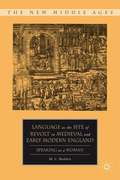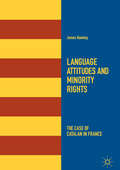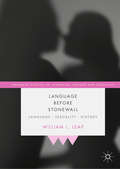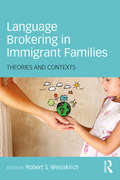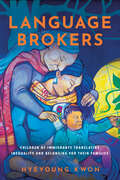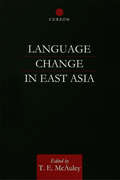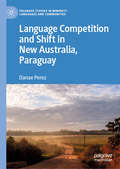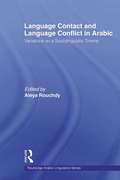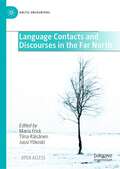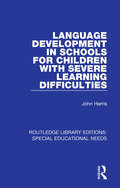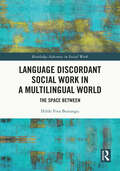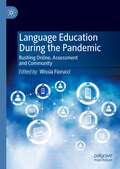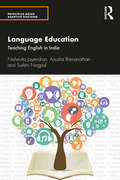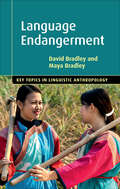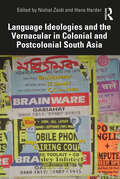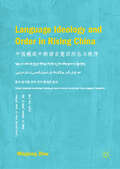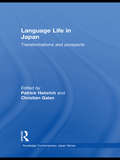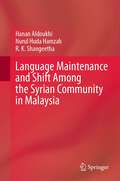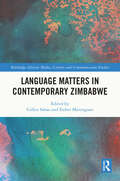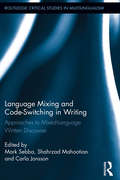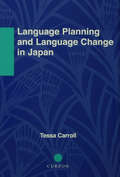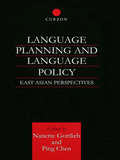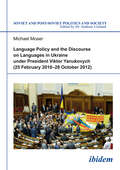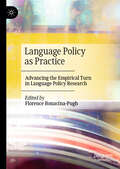- Table View
- List View
Language As The Site Of Revolt In Medieval And Early Modern England
by M. C. BoddenThis bookmakes the provocative argument thatdespite extensive evidence indicating a wholesale suppression of early women's speech, women were actively engaged in cultural practices and speech strategies that weresimultaneously complicitous with patriarchal ideology and subversive in undermining that ideology. "
Language Attitudes and Minority Rights: The Case Of Catalan In France
by James HawkeyThis book presents a detailed sociolinguistic study of the traditionally Catalan-speaking areas of Southern France, and sheds new light on language attitudes, phonetic variation, language ideologies and minority language rights. The region’s complex dual identity, both Catalan and French, both peripheral and strategic, is shown to be reflected in the book’s attitudinal findings which in turn act as reliable predictors of phonetic variation. The author’s careful discursive analysis paints a clear picture of the linguistic ideological landscape: in which French dominates as the language of status and prestige. This innovative work, employing cutting-edge mixed methods, provides an in-depth account of an under-examined language situation, and draws on this research to propose a number of policy recommendations to protect minority rights for speakers of Catalan in the region. Combining language attitudes, sociophonetics, discourse studies, and language policy, this will provide an invaluable reference for scholars of French and Catalan studies and minority languages around the world.
Language Before Stonewall: Language, Sexuality, History (Palgrave Studies in Language, Gender and Sexuality)
by William L. LeapThis book explores the linguistic and social practices related to same-sex desires and identities that were widely attested in the USA during the years preceding the police raid on the Stonewall Inn in 1969. The author demonstrates that this language was not a unified or standardized code, but rather an aggregate of linguistic practices influenced by gender, racial, and class differences, urban/rural locations, age, erotic desires and pursuits, and similar social descriptors. Contrary to preconceptions, moreover, it circulated widely in both public and in private domains. This intriguing book will appeal to students and academics interested in the intersections of language, sexuality and history and queer historical linguistics.
Language Brokering in Immigrant Families: Theories and Contexts
by Robert S. WeisskirchLanguage Brokering in Immigrant Families: Theories and Contexts brings together an international group of researchers to share their findings on language brokering—when immigrant children translate for their parents and other adults. Given the large amount of immigration occurring worldwide, it is important to understand how language brokering may support children’s and families’ acculturation to new countries. The chapter authors include overviews of the existing literature, insights from multiple disciplines, the potential benefits and drawbacks to language brokering, and the contexts that may influence children, adolescents, and emerging adults who language broker. With the latest findings, the authors theorize on how language brokering may function and the outcomes for those who do so.
Language Brokers: Children of Immigrants Translating Inequality and Belonging for Their Families (Articulations: Studies in Race, Immigration, and Capitalism)
by Hyeyoung KwonIn a nation lacking a comprehensive social safety net, people often scramble to find private solutions to structural problems. While existing scholarship primarily focuses on how adults, particularly mothers, navigate systematic gaps in social support, Language Brokers shifts our attention to bilingual children securing crucial resources for their families. Drawing upon interviews with working-class Mexican and Korean American language brokers, as well as healthcare providers, and months of participant observation in a Southern California police station, Hyeyoung Kwon reveals how children of immigrants translate more than simple verbal exchanges. Living at the intersection of multiple forms of inequality, these youth creatively use their in-between status to resolve structural problems to ensure their families' basic citizenship rights are upheld in interactions with teachers, social workers, landlords, doctors, and police officers. In an era of widespread racialized nativism, Language Brokers provides a critical examination of American culture, laying bare the contradictions between the ideals of equality and the exclusion of immigrants. Kwon underscores that dichotomous and racialized understandings of "deserving" and "undeserving" immigrants—which are embedded in everyday interactions and institutional practices—inform the routine ways in which immigrant youth attempt to cultivate belonging for their families.
Language Change in East Asia
by T. E. McAuleyThis book adopts a wide focus on the range of East Asian languages, in both their pre-modern and modern forms, within the specific topic area of language change. It contains sections on dialect studies, contact linguistics, socio-linguistics and syntax/phonology and deals with all three major languages of East Asia: Chinese, Japanese and Korean. Individual chapters cover pre-Sino-Japanese phonology, nominalizers in Chinese, Japanese and Korean; Japanese loanwords in Taiwan Mandarin; changes in Korean honorifics; the tense and aspect system of Japanese; and language policy in Japan. The book will be of interest to linguists working on East Asian languages, and will be of value to a range of general linguists working in comparative or historical linguistics, socio-linguistics, language typology and language contact.
Language Competition and Shift in New Australia, Paraguay (Palgrave Studies in Minority Languages and Communities)
by Danae PerezThis book is an innovative sociolinguistic study of New Australia, an Australian immigrant community in Paraguay in 1893, whose descendants today speak Guarani. Providing fresh data on a previously under-researched community who are an extremely rare case of language shifting from English heritage language to a local indigenous language, the case study is situated within the wider context of the colonial and post-colonial spread of English in Latin America over the past century. Drawing on insights from linguistic anthropology, sociolinguistics, Latin American studies and history, the author presents the history of the colony before closely analysing the interplay of language and identity in this uniquely diasporic setting. This book fills a longstanding gap in the World Englishes and heritage languages literature, and it will be of interest to scholars of colonial and postcolonial languages, and minority language more generally.
Language Contact and Language Conflict in Arabic (Routledge Arabic Linguistics Series)
by Aleya RouchdyThis book contains 17 studies by leading international scholars working on a wide range of topics in Arabic socio-linguistics, divided into four parts. The studies in Part 1 address questions of national language planning in a diglossic situation, with a particular focus on North Africa. Part 2 explores the relationship of identity and language choice in different Arabic-speaking communities living both within and outside the Arab World. Part 3 examines language choice in such diverse contexts as popular preaching, humour and Arab women's writing. Part 4 contains 5 papers in which variation, code-switching and generational language shift in the Arabic-language diaspora in Europe and the USA are the focus. The collection as a whole provides wide-ranging introduction to key areas of current research, which will be of interest to the general sociolinguist as well as the Arabic language specialist.
Language Contacts and Discourses in the Far North (Arctic Encounters)
by Tiina Räisänen Maria Frick Jussi YlikoskiThis open access book sheds light on 21st-Century multilingualism in the Far North of Europe – Finland, Sweden, Norway, and Estonia – an area with multifaceted contacts between many Uralic and Indo-European languages. These contacts are taking new forms as migration and English as the lingua franca are changing the linguistic situation remarkably. The national languages dominate the life of most inhabitants, while the use of indigenous Saami languages, old minority languages, and the languages of new immigrants is limited to certain areas or domains. This volume takes a close look at multilingual individuals and discusses how their lives are affected by different languages.
Language Development in Schools for Children with Severe Learning Difficulties (Routledge Library Editions: Special Educational Needs #31)
by John HarrisFirst published in 1988. Language is an important developmental ability which facilitates communication both at home and at school. It is also the foundation of many of a child’s learning experiences in school. A certain level of language is often a pre-requisite both for success in particular curriculum areas and for the ability to conceptualise generally. Language developing is thus a major concern for those who work with mentally handicapped children and it has come to be regarded as one of the main objectives within the special school curriculum. This book is concerned with the opportunities for language learning which special schools make available for severely mentally handicapped children. It describes how special schools seek to meet the very diverse needs of their pupils and provides a discussion of the success of contemporary approaches to encouraging language development. The author makes a number of constructive criticisms and suggestions for improving practice which should interest anyone whose work involves teaching children with severe learning difficulties.
Language Discordant Social Work in a Multilingual World: The Space Between (Routledge Advances in Social Work)
by Hilde Fiva BuzunguBased on ethnographic observations of encounters between social workers and people with whom they do not have a shared language, this book analyzes the impact of language discordance on the quality of professional service provision. Exploring how street-level bureaucrats navigate the landscape of these discretionary assessments of language discordance, language proficiency, and the need for interpreting, the book focuses on four main themes: the complexity of social work talk the issue of participation in language discordant meetings communicative interaction the issue of how clarification is requested when needed, and whether professionals and service users are able to reach clarity when something is unclear Based on the findings presented on these different aspects of language discordant talk, the consequences of language discordance for social work are presented and discussed, focusing primarily on issues at the intersection of language, communication, power, dominance and subordination, representation, linguicism, and ultimately, human rights and human dignity. It will be of interest to all social work students, academics and professionals as well as those working in public services and allied health more broadly.
Language Education During the Pandemic: Rushing Online, Assessment and Community
by Wissia FiorucciThis edited book explores and illustrates successful practices for online assessment and community-building, based on the authors' own classroom practice during and in the immediate aftermath of the pandemic. The authors argue that what has happened during the coronavirus pandemic has fundamentally changed perspectives on language education, and that if the importance of using online teaching tools in the classroom was dimly understood before the crisis, the language teaching establishment has now fully realized their potential and must continue exploring this further, even as the option to return to in-person teaching becomes widespread. Ranging from online activities to course design, the volume presents a comprehensive outlook at distance learning in modern foreign languages. It does so by focusing on those two aspects that, within an emergency scenario, have proven most challenging, namely: how to assess students in a non-controlled environment and how to foster a sense of community from the confinement of our isolated learning spaces. This book will be of interest to academics and practitioners in Language Education, as well as teachers and teacher trainees.
Language Education: Teaching English in India (Principles-based Adaptive Teaching)
by Nishevita Jayendran Anusha Ramanathan Surbhi NagpalThis book situates the teaching and learning of language in general, and English in particular, within the sociocultural context of India. It engages with current scholarship in literacy studies and the pedagogies of language acquisition and learning. The volume discusses the cultural, discursive and sociopolitical functions of language education and the teaching of English in Indian schools. It examines the importance of adopting flexible pedagogical and multimodal strategies in teaching vocabulary; grammar; literary genres like fiction, poetry and drama; rhetorical discourses; and communicative English to learners for whom English is not one of their home language(s). It also discusses pragmatic approaches to curriculum design for communicative competence and critical literacy rooted in theoretical principles of language education. The authors analyse issues relevant to secondlanguage acquisition; English language teaching (ELT); emergent, adult and critical literacies; and critical pedagogies in language and literature. Written in an accessible style, the book comes with case studies, exercises and additional references to support an independent exploration of the fields. This book will be of interest to students and teachers of language, literature and education, as well as teachers and educators in schools and universities. It is also of relevance to policymakers, non-governmental organisations and public and private sector bodies that work in the fields of language and literacy.
Language Endangerment (Key Topics in Applied Linguistics)
by David Bradley Maya BradleyUp to ninety percent of humanity's traditional languages and cultures are at risk and may disappear this century. While language endangerment has not achieved the publicity surrounding environmental change and biodiversity loss, it is just as serious, disastrously reducing the variety of human knowledge and thought. This book shows why it matters, why and how it happens, and what communities and scholars can do about it. David and Maya Bradley provide a new framework for investigating and documenting linguistic, social and other factors which contribute to languages shifting away from their cultural heritage. Illustrated with practical in-depth case studies and examples from the authors' own work in Asia and elsewhere, the book encourages communities to maintain or reclaim their traditional languages and cultures.
Language Ideologies and the Vernacular in Colonial and Postcolonial South Asia: Rethinking Language, Culture And Society
by Nishat Zaidi Hans HarderThis volume critically engages with recent formulations and debates regarding the status of the regional languages of the Indian subcontinent vis-à-vis English. It explores how language ideologies of the “vernacular” are positioned in relation to the language ideologies of English in South Asia. The book probes into how we might move beyond the English-vernacular binary in India, explores what happened to “bhasha literatures” during the colonial and post-colonial periods and how to position those literatures by the side of Indian English and international literature. It looks into the ways vernacular community and political rhetoric are intertwined with Anglophone (national or global) positionalities and their roles in political processes. This book will be of interest to researchers, students and scholars of literary and cultural studies, Indian Writing in English, Indian literatures, South Asian languages and popular culture. It will also be extremely valuable for language scholars, sociolinguists, social historians, scholars of cultural studies and those who understand the theoretical issues that concern the notion of “vernacularity”.
Language Ideology and Order in Rising China
by Minglang ZhouThis text considers contemporary China’s language ideology and how it supports China as a rising global power player. It examines the materialization of this ideology as China’s language order unfolds on two front, promoting Putonghua domestically and globally, alongside its economic growth and military expansion. Within the conceptual framework of language ideology and language order and using PRC policy documents, education annals, and fieldwork, this book explores how China’s language ideology is related to its growing global power as well as its domestic and global outreaches. It also addresses how this ideology has been materialized as a language order in terms of institutional development and support, and what impact these choices are having on China and the world. Focusing on the relationship between language ideology and language order, the book highlights a closer and coherent linguistic association between China’s domestic drive and global outreach since the turn of the century.
Language Life in Japan: Transformations and Prospects (Routledge Contemporary Japan Series)
by Patrick HeinrichDespite its monolingual self-image, Japan is multilingual and growing more so due to indigenous minority language revitalization and as an effect of migration. Besides Japan's autochthonous languages such as the Ainu and Ryukyuan languages, there are more than 75,000 immigrant children in the Japanese public education system alone who came to Japan in the 1980s and who speak more than a hundred different languages. Added to this growing linguistic diversity, the importance of English as the language of international communication in business and science especially is hotly debated. This book analyses how this linguistic diversity, and indeed recognition of this phenomenon, presents a wide range of sociolinguistic challenges and opportunities in fundamental institutions such as schools, in cultural patterns and in social behaviours and attitudes. This topic is an important one as Japan fights to re-establish itself in the new world order and will be of interest to all those who are concerned language change, language versus dialect, the effect of modern technology on language usage, and the way national and social problems are always reflected through the prism of language.
Language Maintenance and Shift Among the Syrian Community in Malaysia
by Hanan Aldoukhi Nurul Huda Hamzah R. K. ShangeethaThis book investigates language choices in different domains among Syrian Arab Muslim families who came to Malaysia after war broke out in their country. It focuses on how Syrian Heritage Language (HL), Modern Standard Arabic (MSA), Classical Arabic (CA), and other languages that might be spoken by these families were maintained and/or shifted from the time these families came to Malaysia until the lockdown due to the COVID-19 pandemic. Most works on Syrian community in Malaysia are focused on social and humanitarian issues; none has explored how Syrians in Malaysia are managing their language use in connection with day-to-day communication and integration. As the Syrian community in Malaysia adapts by learning the host language, their mother language/s might experience a shift. The way the minority communities view their mother language by prioritizing or deprioritizing its use in the family milieu are factors that contribute to language maintenance and language shift (LMLS). As such, this book provides insights on how Syrian parents are managing their own and their children’s language/s, along with the language of the host country.
Language Matters in Contemporary Zimbabwe (Routledge African Media, Culture and Communication Studies)
by Esther Mavengano Collen SabaoSpeaking to a broader global preoccupation with the state of languages and language development, this book considers issues surrounding the diverse languages, linguistic communities, and cultures of Zimbabwe.Reflecting on Shona, Xitsonga, Sotho, Xhosa, Tjwao, Nambya, IsiNdebele, Nyanja, Tshivenda, English and Braille, the book uncovers both the internal and external factors that impact language structures, language use and language ideologies across the country. The book considers how colonial legacies and contemporary language domination and minoritisation have led to language endangerment. It considers the fate of communities whose languages are marginalised and, in the process, poses questions on what can and should be done to preserve Zimbabwean languages. The authors' offerings range across subjects as diverse as music, linguistic innovation, education, human rights, literature, language politics and language policy, in order to build a rich and nuanced picture of language matters in the country.Coming at a critical moment of increasing mobility, migration, cultural plurality and globalisation, this book will be an important resource for researchers across African literature, linguistics, communication, policy and politics.
Language Mixing and Code-Switching in Writing: Approaches to Mixed-Language Written Discourse (Routledge Critical Studies in Multilingualism)
by Mark Sebba Shahrzad Mahootian Carla Jonsson"Code-switching," or the alternation of languages by bilinguals, has attracted an enormous amount of attention from researchers. However, most research has focused on spoken language, and the resultant theoretical frameworks have been based on spoken code-switching. This volume presents a collection of new work on the alternation of languages in written form. Written language alternation has existed since ancient times. It is present today in a great deal of traditional media, and also exists in newer, less regulated forms such as email, SMS messages, and blogs. Chapters in this volume cover both historical and contemporary language-mixing practices in a large range of language pairs and multilingual communities. The research collected here explores diverse approaches, including corpus linguistics, Critical Discourse Analysis, literacy studies, ethnography, and analyses of the visual/textual aspects of written data. Each chapter, based on empirical research of multilingual writing, presents methodological approaches as models for other researchers. New perspectives developed in this book include: analysis specific to written, rather than spoken, discourse; approaches from the new literacy studies, treating mixed-language literacy from a practice perspective; a focus on both "traditional" and "new" media types; and the semiotics of both text and the visual environment.
Language Planning and Language Change in Japan: East Asian Perspectives
by Tessa CarrollHighlights the shift in language planning and language change in Japan at the end of the 20th century against a background of significant socio-cultural, political, and economic change and places them in a comparative context. Issues investigated include the concept of disorder in language; changes in official language; changing attitudes to region
Language Planning and Language Policy: East Asian Perspectives
by Nanette Gottlieb Ping ChenExamines the major issues of language planning and policy in Japan, Mainland China, Hong Kong, Taiwan, Korea and Vietnam, particularly those relating to the selection of official language, script, and written language.
Language Policy and Discourse on Languages in Ukraine Under President Viktor Yanukovych
by Michael MoserDeclared the country's official language in 1996, Ukrainian has weathered constant challenges by post-Soviet political forces promoting Russian. Michael Moser provides the definitive account of the policies and ethno-political dynamics underlying this unique cultural struggle.
Language Policy and Discourse on Languages in Ukraine Under President Viktor Yanukovych: (25 February 2010–28 October 2012) (Soviet and Post-Soviet Politics and Society #122)
by Michael MoserDeclared the country's official language in 1996, Ukrainian has weathered constant challenges by post-Soviet political forces promoting Russian. Michael Moser provides the definitive account of the policies and ethno-political dynamics underlying this unique cultural struggle.
Language Policy as Practice: Advancing the Empirical Turn in Language Policy Research
by Florence Bonacina-PughThis edited book brings together original contributions from scholars working across Language Policy and Planning to advance the recent 'Empirical turn' that has taken place in the field. All the chapters in the volume show how Language Policy can be conceptualized 'as practice' in a variety of domains, ranging from the home to the workplace, schools, and higher education. The authors also suggest further theoretical, methodological, and empirical developments for the discipline in light of this epistemological shift. A Foreword and an Afterword shed light on the theoretical and empirical lineage of this volume and show how this book contributes to the humanization of Language Policy research. This book will be of interest to scholars and post-graduate students working across Language Policy and Planning, Language in Education Policy, and Family Language Policy, as well as those in adjacent fields including Education Policy, Classroom Discourse, Linguistic Anthropology, Sociologyof Education, and Multilingualism.
